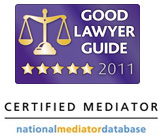Mediation Advice and Advocacy
Mediation is fundamentally different from litigation and adjudication, in that the aim is not to persuade the mediator of the merits of your case, but to persuade your opponent.
Or to be more precise: there is no backstop if you fail to persuade (or be persuaded by) your opponent during the process; the mediator will not make a decision on the dispute if it remains unresolved at the end of the mediation.
This basic difference means that a distinct approach to advocacy is required.
One of the reasons that disputants hand over decision-making power in their affairs to third parties such as judges and adjudicators is that they can no longer look the other party with whom they would need to take the decision in the eye.
An advocate can do so, however, without the same inner resistance, or negative psychological impact.
We are experienced in speaking, and listening to, opposing parties, both as an advocate for a party to a mediation, and as the mediator.
This means that disputes that are objectively capable of resolution by consent (which is and always has been the vast majority of disputes) are not pursued purely on the strength of bad feeling and relationship breakdown between the parties.
This may seem like a soft skill to hardened users of the courts, but it can save a great deal of time, money, energy and distress.


